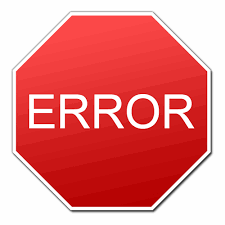记忆方法
将“error”分解为“er”和“ror”,想象有一个人(er)跌倒(ror)了,这样的画面可以帮助记忆这个单词代表“错误”或“故障”的含义。
以上内容由AI生成, 仅供参考和借鉴
中文词源
error 错误
来自err, 犯错误。
英语词源
- error
-
error: see err
- error (n.)
- also, through 18c., errour; c. 1300, "a deviation from truth made through ignorance or inadvertence, a mistake," also "offense against morality or justice; transgression, wrong-doing, sin;" from Old French error "mistake, flaw, defect, heresy," from Latin errorem (nominative error) "a wandering, straying, a going astray; meandering; doubt, uncertainty;" also "a figurative going astray, mistake," from errare "to wander" (see err). From early 14c. as "state of believing or practicing what is false or heretical; false opinion or belief, heresy." From late 14c. as "deviation from what is normal; abnormality, aberration." From 1726 as "difference between observed value and true value."
Words for "error" in most Indo-European languages originally meant "wander, go astray" (for example Greek plane in the New Testament, Old Norse villa, Lithuanian klaida, Sanskrit bhrama-), but Irish has dearmad "error," from dermat "a forgetting."
权威例句
- 1. The plane was shot down in error by a NATO missile.
- 一枚北约的导弹误将那架飞机击落。
- 2. The hospital blamed the mix-up on a clerical error.
- 医院方面将这一混乱归咎于一处笔误。
- 3. You have to allow for a certain amount of error.
- 你必须将一定量的误差考虑在内。
- 4. Every error is captured, every decision picked to pieces.
- 每个错误都会被抓住,每个决定都会被骂得一无是处。
- 5. The government has said it was an inadvertent error.
- 政府声称那是因疏忽造成的过失。

